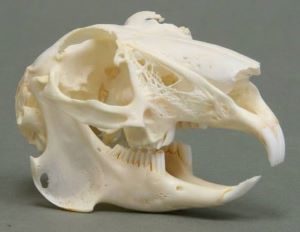 Rabbits and Rodents
Rabbits and Rodents
Dental problems in some exotic species can be very common. Rabbits and rodents have continuous growing or “open ended” incisors. Rabbits and some rodents, like guinea pigs and chinchillas, also have continuously growing molars. If these animals are not fed the correct food items in the correct proportions, they can develop spurs, points or overgrown teeth. In some cases, there may be a genetic predisposition to developing dental problems, meaning that teeth problems may run in your pet’s family. If left untreated, these teeth problems will become painful and start preventing your pet from eating properly and drooling, which will lead to weight loss and low energy. This can also lead to abscess, a pocket of pus or infections, formations along the roots of the teeth. Any stage of dental disease in these species can quickly become a life-threatening problem.
The doctors and staff at our Toronto clinic are uniquely equipped to deal with these issues and can advise on a number of options best suited to your individual pet, to prevent, maintain or even cure these problems. Many times we can examine and properly clip your rabbit, guinea pig or chinchilla’s teeth during your visit with you present. In severe or difficult cases, an anesthetic may be needed to thoroughly examine your pet’s mouth. Specialized equipment is used to prevent splintering or shattering teeth, which could lead to other problems, so clipping teeth should only be done by a veterinarian who is knowledgeable with these unique problems and species.
Other Mammals
Other mammals, like ferrets, dogs and cats, develop only one set of adult teeth. A deciduous, or baby, set of teeth will grow initially and be replaced by a permanent adult set. Just like our teeth, regular maintenance is needed on these teeth to prevent dental problems. This is done mainly through proper diets in many of the exotic species. Brushing your pet’s teeth, especially in ferrets, dogs and cats, is also a very useful tool in preventing dental disease. Our staff can help get you started on the right preventative program as well as deal with any dental issues your pet may have.
Reptiles
Not all reptiles have teeth. Turtles and tortoises do not have teeth; whereas, lizards and snakes do. Some species will replace their teeth constantly throughout their lives, but replacement may take months or years, so care should be taken to prevent damaging their teeth. Reptile teeth are fairly simple, with all teeth being of similar shape and size, or homodonty. They are specialized for the way they eat and the food they eat, and are mainly used for grabbing or holding food items. Food is swallowed whole or in large chunks without chewing so diverse teeth, as seen in mammals, are not necessary.
Birds
Birds do not have teeth as they have beaks instead. Like different types of teeth, different styles of beaks are specialized for a bird’s eating habits. For example, parrots’ beaks are made for crushing, songbirds’ (like finches and canaries) are made for picking, while raptors’ (like eagles, hawks and owls) are made for tearing flesh. Just like teeth, beaks can develop malocclusion and overgrowth, and regular maintenance may be required.
********************************************************************************
Regardless of the pet you have, dental and oral care is an important component in maintaining a healthy and happy animal. Schedule your appointment today to learn more about what you can do to help maintain optimal dental health in your pet and prevent future problems!

